- Home
- Michael Crichton
Micro Page 2
Micro Read online
Page 2
“The one who photographs guys out cheating with their secretaries?”
“That’s him. Kept getting beat up. Anyway, he’s there too, and he’s got cuts all over his body—face, forehead, hand, legs, back of the neck. Never seen anything like it.”
“Test cuts?”
Watanabe shook his head. “No. Examiner says no, too. The injuries were done to him, and done over some period of time, maybe an hour. We got his blood on the back stairs, and his bloody footprints walking up. Blood in his car parked beside the building. So he was already bleeding when he walked in the door.”
“Then what do you think happened?”
“I got no idea,” Watanabe said. “If this is suicide, it’s three guys without notes, and nobody ever heard of that. Plus no knife, and we turned the place upside down looking, I can tell you. Plus it was locked from the inside, so nobody could have left. Windows were closed and locked, too. We dusted around the windows for prints anyway, just in case somebody entered by a window. No fresh prints around the windows, just a bunch of dirt.”
“Somebody flush a blade down the toilet?” Kalama asked.
“No,” Dan Watanabe answered. “There wasn’t any blood in the bathroom. Means nobody went in there after the cutting started. So we got three dead guys slashed to death in a locked room. No motive, no weapon, no nothing.”
“Now what?”
“That Portugee PI came from somewhere. He already got cut up somewhere else. I figure try to find out where that happened. Where it started.” Watanabe shrugged. “He had a gas receipt from Kelo’s Mobil in Kalepa. Filled the tank at ten p.m. We know how much gas he used, so we can get a radius of where he could drive from Kelo’s to his destination and then back to Willy’s.”
“Big radius. Must cover most of the island.”
“We’re chipping away. There’s fresh gravel in the tire treads. It’s crushed limestone. Good chance he went to a new construction site, something like that. Anyway, we’ll run it down. It may take us a while, but we’ll get that location.” Watanabe pushed the paper across the desk. “And in the meantime…I’d say the papers got it right. Triple suicide pact, and that’s the end of it. At least for now.”
Chapter 1
Divinity Avenue, Cambridge 18 October, 1:00 p.m.
I n the second-floor biology lab, Peter Jansen, twenty-three, slowly lowered the metal tongs into the glass cage. Then, with a quick jab, he pinned the cobra just behind its hood. The snake hissed angrily as Jansen reached in, gripped it firmly behind the head, raised it to the milking beaker. He swabbed the beaker membrane with alcohol, pushed the fangs through, and watched as yellowish venom slid down the glass.
The yield was a disappointing few milliliters. Jansen really needed a half-dozen cobras in order to collect enough venom to study, but there was no room for more animals in the lab. There was a reptile facility over in Allston, but the animals there tended to get sick; Peter wanted his snakes nearby, where he could supervise their condition.
Venom was easily contaminated by bacteria; that was the reason for the alcohol swab and for the bed of ice the beaker sat on. Peter’s research concerned bioactivity of certain polypeptides in cobra venom; his work was part of a vast research interest that included snakes, frogs, and spiders, all of which made neuroactive toxins. His experience with snakes had made him an “envenomation specialist,” occasionally called by hospitals to advise on exotic bites. This caused a certain amount of envy among other graduate students in the lab; as a group, they were highly competitive and quick to notice if anyone got attention from the outside world. Their solution was to complain that it was too dangerous to keep a cobra in the lab, and that it really shouldn’t be there. They referred to Peter’s research as “working with nasty herps.”
None of this bothered Peter; his disposition was cheerful and even-handed. He came from an academic family, so he didn’t take this backbiting too seriously. His parents were no longer alive, killed in the crash of a light plane in the mountains of Northern California. His father had been a professor of geology at UC Davis, and his mother had taught on the medical faculty in San Francisco; his older brother was a physicist.
Peter had returned the cobra to the cage just as Rick Hutter came over. Hutter was twenty-four, an ethnobotanist. Lately he had been researching analgesics found in the bark of rain-forest trees. As usual, Rick was wearing faded jeans, a denim shirt, and heavy boots. He had a trimmed beard and a perpetual frown. “I notice you’re not wearing your gloves,” he said.
“No,” Peter said, “I’ve gotten pretty confident—”
“When I did my field work, you had to wear gloves,” he said. Rick Hutter never lost an opportunity to remind others in the lab that he had done actual field work. He made it sound as if he had spent years in the remote Amazon backwaters. In fact, he had spent four months doing research in a national park in Costa Rica. “One porter in our team didn’t wear gloves, and reached down to move a rock. Bam! Terciopelo sunk its fangs into him. Fer-de-lance, two meters long. They had to amputate his arm. He was lucky to survive at all.”
“Uh-huh,” Peter said, hoping Rick would get going. He liked Rick, but the guy had a tendency to lecture everybody.
The person in the lab who really disliked Rick Hutter was Karen King. Karen, a tall young woman with dark hair and angular shoulders, was studying spider venom and spiderwebs. She overheard Rick lecturing Peter on snakebite in the jungle, and couldn’t stand it. She had been working at a lab bench, and she snapped over her shoulder, “Rick—you stayed in a tourist lodge in Costa Rica. Remember?”
“Bullshit. We camped in the rain forest—”
“Two whole nights,” Karen interrupted him, “until the mosquitoes drove you back to the lodge.”
Rick glared at Karen. His face turned red, and he opened his mouth to say something, but didn’t. Because he couldn’t reply. It was true: the mosquitoes had been hellish. He’d been afraid the mosquitoes might give him malaria or dengue hemorrhagic fever, so he had gone back to the lodge.
Instead of arguing with Karen King, Rick turned to Peter: “Hey, by the way. I heard a rumor that your brother is coming today. Isn’t he the one who struck it rich with a startup company?”
“That’s what he tells me.”
“Well, money isn’t everything. Myself, I’d never work in the private sector. It’s an intellectual desert. The best minds stay in universities so they don’t have to prostitute themselves.”
Peter wasn’t about to argue with Rick, whose opinions on any subject were strongly held. But Erika Moll, the entomologist who’d recently arrived from Munich, said, “I think you are being rigid. I wouldn’t mind working for a private company at all.”
Hutter threw up his hands. “See? Prostituting.”
Erika had slept with several people in the biology department, and didn’t seem to care who knew. She gave him the finger and said, “Spin on it, Rick.”
“I see you’ve mastered American slang,” Rick said, “among other things.”
“The other things, you wouldn’t know,” she said. “And you won’t.” She turned to Peter. “Anyway, I see nothing wrong with a private job.”
“But what is this company, exactly?” said a soft voice. Peter turned and saw Amar Singh, the lab’s expert in plant hormones. Amar was known for his distinctly practical turn of mind. “I mean, what does the company do that makes it so valuable? And this is a biological company? But your brother is a physicist, isn’t he? How does that work?”
At that moment, Peter heard Jenny Linn across the lab say, “Wow, look at that!” She was staring out the window at the street below. They could hear the rumble of high-performance engines. Jenny said, “Peter, look—is that your brother?”
Everyone in the lab had gone to the windows.
Peter saw his brother on the street below, beaming like a kid, waving up at them. Eric was standing alongside a bright yellow Ferrari convertible, his arm around a beautiful blond woman. Behind them was a secon
d Ferrari, gleaming black. Someone said, “Two Ferraris! That’s half a million dollars down there.” The rumble of the engines echoed off the scientific laboratories that lined Divinity Avenue.
A man stepped out of the black Ferrari. He had a trim build and expensive taste in clothes, though his look was decidedly casual.
“That’s Vin Drake,” Karen King said, staring out the window.
“How do you know?” Rick Hutter said to her, standing beside her.
“How do you not know?” Karen replied. “Vincent Drake is probably the most successful venture capitalist in Boston.”
“You ask me, it’s a disgrace,” Rick said. “Those cars should have been outlawed years ago.”
But nobody was listening to him. They were all heading for the stairs, hurrying down to the street. Rick said, “What is the big deal?”
“You didn’t hear?” Amar said, hurrying past Rick. “They’ve come here to recruit.”
“Recruit? Recruit who?”
“Anybody doing good work in the fields that we’re interested in,” Vin Drake said to the students clustered around him. “Microbiology, entomology, chemical ecology, ethnobotany, phytopathology—in other words, all research into the natural world at the micro- or nano-level. That’s what we’re after, and we’re hiring now. You don’t need a PhD. We don’t care about that; if you’re talented you can do your thesis for us. But you will have to move to Hawaii, because that’s where the labs are.”
Standing to one side, Peter embraced his brother, Eric, then said, “Is that true? You’re already hiring?”
The blond woman answered. “Yes, it’s true.” She stuck out her hand and introduced herself as Alyson Bender, the CFO of the company. Alyson Bender had a cool handshake with a crisp manner, Peter thought. She wore a fawn-colored business suit with a string of natural pearls at her neck. “We need at least a hundred first-rate researchers by the end of the year,” she said. “They’re not easy to find, even though we offer what is probably the best research environment in the history of science.”
“Oh? How is that?” Peter said. It was a pretty big claim.
“It’s true,” his brother said. “Vin will explain.”
Peter turned to his brother’s car. “Do you mind…” He couldn’t help himself. “Could I get in? Just for a minute?”
“Sure, go ahead.”
He slipped behind the wheel, shut the door. The bucket seat was tight, enveloping; the leather smelled rich; the instruments were big and business-like, the steering wheel small, with unusual red buttons on it. Sunlight gleamed off the yellow finish. Everything felt so luxurious, he was a little uneasy; he couldn’t tell if he liked this feeling or not. He shifted in the seat, and felt something under his thigh. He pulled out a white object that looked like a piece of popcorn. And it was light like popcorn, too. But it was stone. He thought the rough edges would scratch the leather; he slipped it into his pocket and climbed out.
One car over, Rick Hutter was glowering at the black Ferrari, as Jenny Linn admired it. “You must realize, Jenny,” Rick said, “that this car, squandering so many resources, is an offense against Mother Earth.”
“Really?” Jenny said. “Did she tell you that?” She ran her fingers along the fender. “I think it’s beautiful.”
In a basement room furnished with a Formica table and a coffee machine, Vin Drake had seated himself at the table, with Eric Jansen and Alyson Bender, the two Nanigen executives, placed on either side of him. The grad students clustered around, some sitting at the table, some leaning against the wall.
“You’re young scientists, starting out,” Vin Drake was saying. “So you have to deal with the reality of how your field operates. Why, for example, is there such an emphasis on the cutting edge in science? Why does everybody want to be there? Because all the prizes and recognition go to new fields. Thirty years ago, when molecular biology was new, there were lots of Nobels, lots of major discoveries. Later, the discoveries became less fundamental, less groundbreaking. Molecular biology was no longer new. By then the best people had moved on to genetics, proteomics, or to work in specialized areas: brain function, consciousness, cellular differentiation, where the problems were immense and still unsolved. Good strategy? Not really, because the problems remain unsolved. Turns out it isn’t enough that the field is new. There must also be new tools. Galileo’s telescope—a new vision of the universe. Leeuwenhoek’s microscope—a new vision of life. And so it continues, right to the present: radio telescopes exploded astronomical knowledge. Unmanned space probes rewrote our knowledge of the solar system. The electron microscope altered cell biology. And on, and on. New tools mean big advances. So, as young researchers, you should be asking yourselves—who has the new tools?”
There was a brief silence. “Okay, I’ll bite,” someone said. “Who has the new tools?”
“We do,” Vin said. “Nanigen MicroTechnologies. Our company has tools that will define the limits of discovery for the first half of the twenty-first century. I’m not kidding, I’m not exaggerating. I’m telling you the simple truth.”
“Pretty big claim,” Rick Hutter said. He leaned against the wall, arms folded, clutching a paper cup of coffee.
Vin Drake looked calmly at Rick. “We don’t make big claims without a reason.”
“So what exactly are your tools?” Rick went on.
“That’s proprietary,” Vin said. “You want to know, you sign an NDA and come to Hawaii to see for yourself. We’ll pay your airfare.”
“When?”
“Whenever you’re ready. Tomorrow, if you want.”
Vin Drake was in a hurry. He finished the presentation, and they all filed out of the basement and went out onto Divinity Avenue, to where the Ferraris were parked. In the October afternoon, the air had a bite, and the trees burned with orange and russet colors. Hawaii might have been a million miles from Massachusetts.
Peter noticed Eric wasn’t listening. He had his arm around Alyson Bender, and he was smiling, but his thoughts were elsewhere.
Peter said to Alyson, “Would you mind if I took a family moment here?” Grabbing his brother’s arm, he walked him down the street away from the others.
Peter was five years younger than Eric. He had always admired his brother, and coveted the effortless way Eric seemed to manage everything from sports to girls to his academic studies. Eric never strained, never seemed to sweat or worry. Whether it was a playoff game for the lacrosse team, or oral exams for his doctorate, Eric always seemed to know how to play things. He was always confident, always easy.
“Alyson seems nice,” Peter said. “How long have you been seeing her?”
“Couple of months,” Eric said. “Yes, she’s nice.” Somehow, he didn’t sound enthusiastic.
“Is there a but?”
Eric shrugged. “No, just a reality. Alyson’s got an MBA. Truth is, she’s all business, and she can be tough. You know—Daddy wanted a boy.”
“Well, Eric, she’s very pretty for a boy.”
“Yes, she’s pretty.” That tone again.
Feeling around, Peter said, “And how’re things with Vin?” Vincent Drake had a somewhat unsavory reputation, had been threatened twice with federal indictments; he had beaten back prosecutors both times, although no one knew quite how. Drake was regarded as tough, smart, and unscrupulous, but above all, successful. Peter had been surprised when Eric first signed on with him.
“Vin can raise money like nobody else,” Eric said. “His presentations are brilliant. And he always lands the tuna, as they say.” Eric shrugged. “I accept the downside, which is that Vin will say whatever he needs to say to get a deal done. But lately he’s been, well…more careful. More presidential.”
“So he’s the president of the company, Alyson’s the CFO, and you’re—?”
“Vice president in charge of technology,” Eric said.
“Is that okay?”
“It’s perfect. I want to be in charge of the technology.” He smiled. “And to dr
ive a Ferrari…”
“What about those Ferraris?” Peter said, as they approached the cars. “What’re you going to do with them?”
“We’ll drive them down the East Coast,” Eric said. “Stop at major university biology labs along the way, and do this little song-and-dance to drum up candidates. And then turn in the cars in Baltimore.”
“Turn them in?”
“They’re rented,” Eric said. “Just a way to get attention.”
Peter looked back at the crowd around the cars. “Works.”
“Yes, we figured.”
“So you really are hiring now?”
“We really are.” Again, Peter detected a lack of enthusiasm in his brother’s voice.
“Then what’s wrong, bro?”
“Nothing.”
“Come on, Eric.”
“Really, nothing. The company is underway, we’re making great progress, the technology is amazing. Nothing’s wrong.”
Peter said nothing. They walked in silence for a moment. Eric stuck his hands in his pockets. “Everything’s fine. Really.”
“Okay.”
“It is.”
“I believe you.” They came to the end of the street, turned, headed back toward the group clustered around the cars.
“So,” Eric said, “tell me: which one of those girls in your lab are you seeing?”

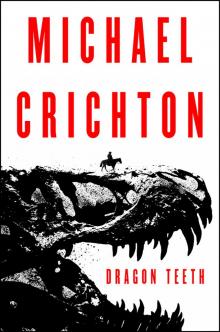 Dragon Teeth
Dragon Teeth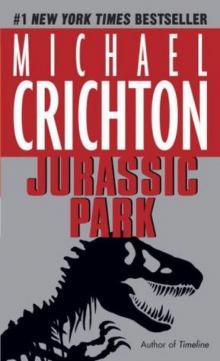 Jurassic Park
Jurassic Park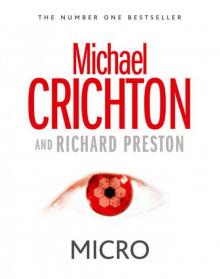 Micro
Micro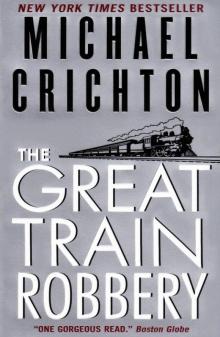 The Great Train Robbery
The Great Train Robbery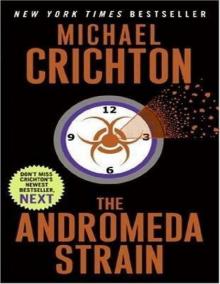 The Andromeda Strain
The Andromeda Strain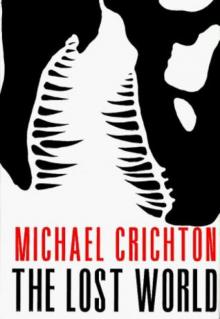 The Lost World
The Lost World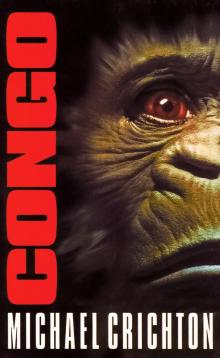 Congo
Congo Travels
Travels Timeline
Timeline Sphere
Sphere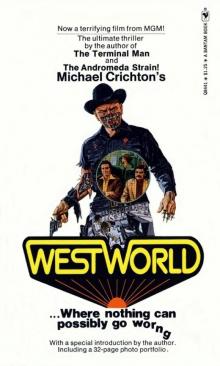 Westworld
Westworld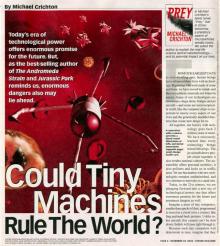 Prey
Prey State Of Fear
State Of Fear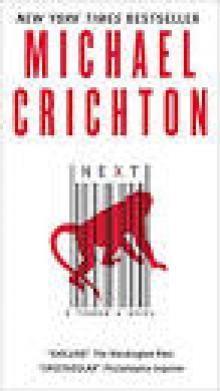 Next
Next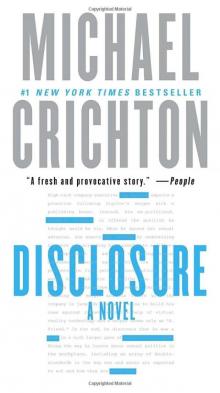 Disclosure
Disclosure Pirate Latitudes
Pirate Latitudes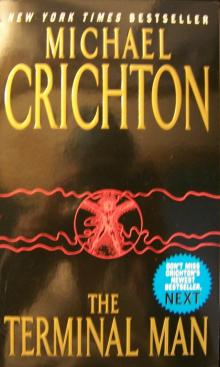 The Terminal Man
The Terminal Man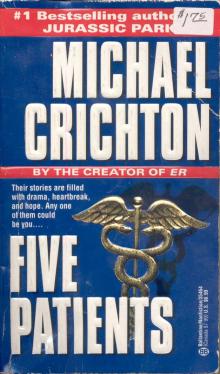 Five Patients
Five Patients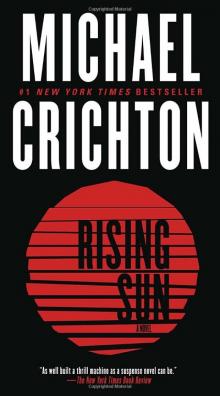 Rising Sun
Rising Sun Binary
Binary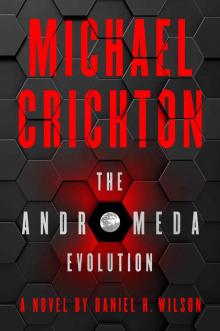 The Andromeda Evolution
The Andromeda Evolution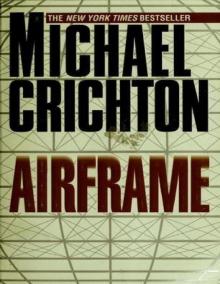 Airframe
Airframe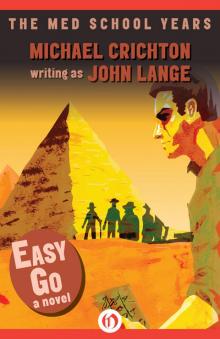 Easy Go
Easy Go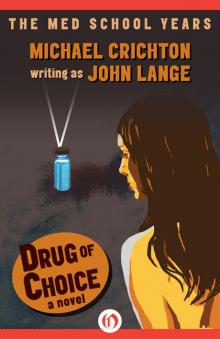 Drug of Choice
Drug of Choice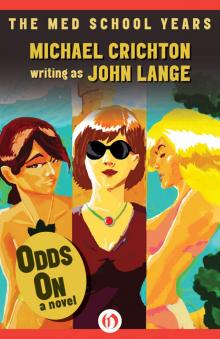 Odds On: A Novel
Odds On: A Novel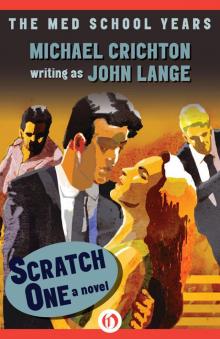 Scratch One
Scratch One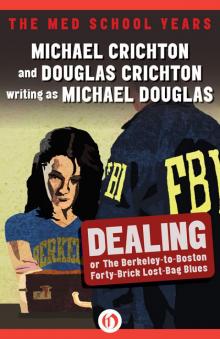 Dealing or The Berkeley-to-Boston Forty-Brick Lost-Bag Blues
Dealing or The Berkeley-to-Boston Forty-Brick Lost-Bag Blues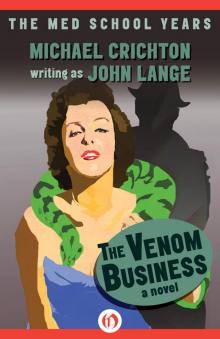 Venom Business
Venom Business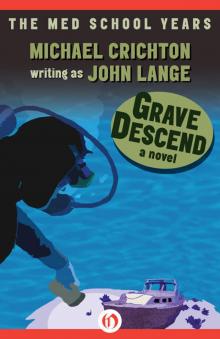 Grave Descend
Grave Descend Gold - Pirate Latitudes
Gold - Pirate Latitudes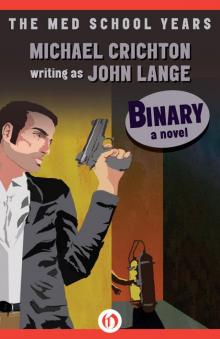 Binary: A Novel
Binary: A Novel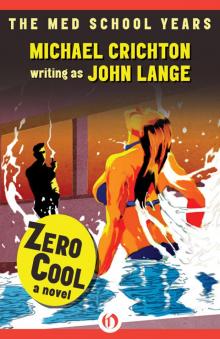 Zero Cool
Zero Cool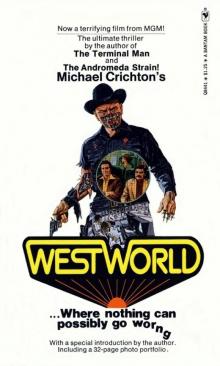 Delos 1 - Westworld
Delos 1 - Westworld